Jicho’s Infant Kidumu Freed from Poacher’s Snare by Drs. Eddy and Martin in Virunga National Park
By Gorilla Doctors Staff on Wednesday, September 3rd, 2014 in Blog.On Monday, August 25, the Gorilla Doctors team received a call from Virunga National Park warden Innocent Mburanumwe notifying our veterinarians that a baby mountain gorilla named Kidumu, the infant of adult female Jicho, was caught in a snare. The park rangers had spotted the snare that morning and was able to cut it free from the anchor point in the vegetation, but the wire noose remained around her arm.
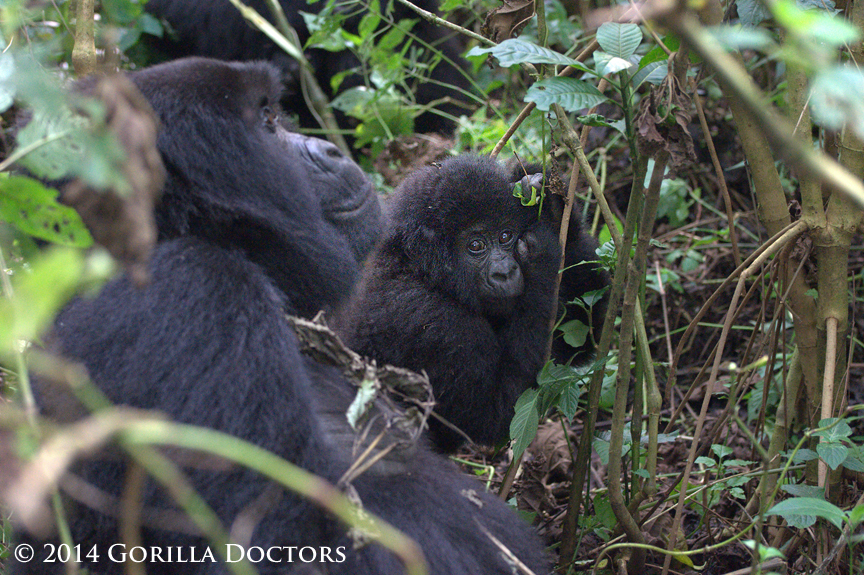 Infant Kidumu with mother Jicho, before the intervention.
Infant Kidumu with mother Jicho, before the intervention.
Kidumu is one of the infants in the Mapuwa family, a group of 20 mountain gorillas in Virunga National Park that ranges in the Jomba and Bikenge areas of the park. The group is lead by dominant silverback Mapuwa, but he is now getting old and the second ranking silverback, Mvuyekure, is taking over leadership responsibilities.
Mvuyekure, Dr. Eddy’s “favorite gorilla” has an interesting story: it is rumored that when he was a young juvenile, he was poached from the park and park authorities confiscated him at the Bunagana border (on the border of Uganda and DRC). ICCN officials decided to reintroduce him back in his group since he was positively identified. Mvuyekure was successfully reintroduced and now he is a silverback, leading the group.
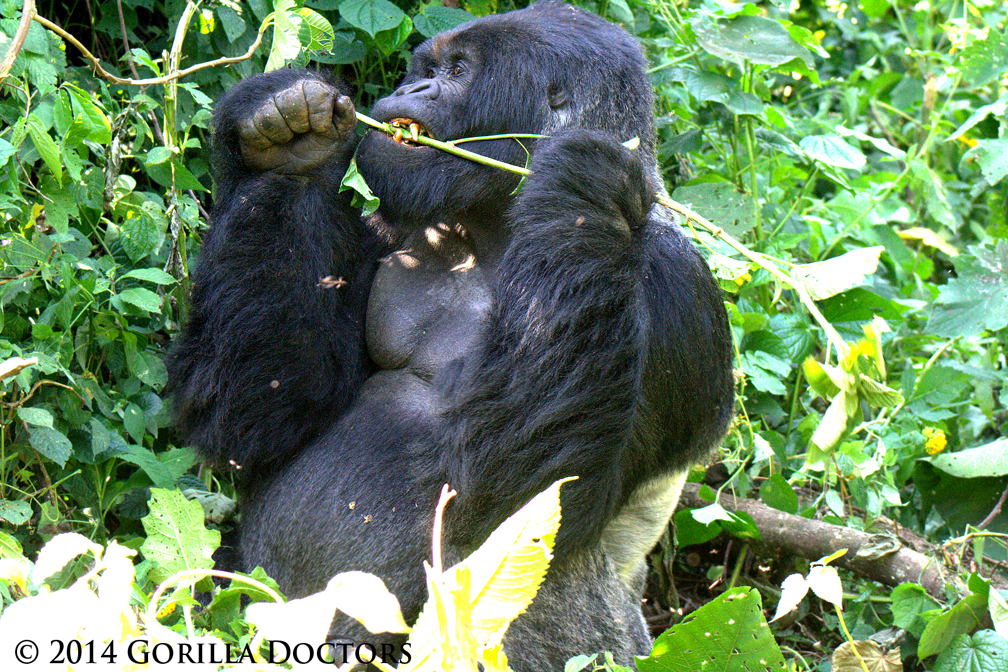 Silverback Mvuyekure in Mapuwa group. Virunga National Park, DRC.
Silverback Mvuyekure in Mapuwa group. Virunga National Park, DRC.
Here is Dr. Eddy’s report from the intervention:
“We left Goma around 11am and reached the Jomba patrol post after three hours of travel. Dr. Martin and I, along with a team of ICCN rangers and porters, started treking at 2:30pm, walking along the park boundary in community potato fields.
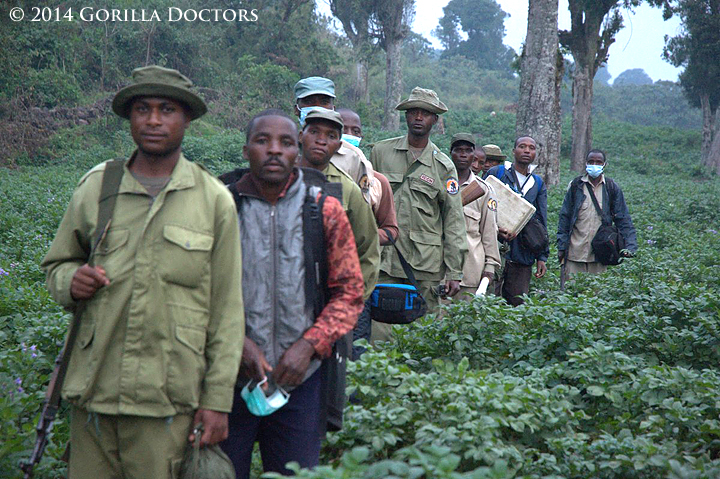 The intervention team: Drs. Eddy and Martin, ICCN trackers and porters.
The intervention team: Drs. Eddy and Martin, ICCN trackers and porters.
We located the group at 3:45pm, about 200 meters from the park boundary around the Runyoni area (where the M23 rebel group’s former headquarters were located). The group was moving fast looking for bamboo shoots and getting close to nesting time for the evening. We spotted the ensnared baby and she was clinging to her mother Jicho. It was clear that both mother and infant would have to be anesthetized to safely complete the intervention.
Dr. Martin darted Jicho with the anesthesia first and once she was fully sedated, I hand injected the anesthesia for Kidumu at 4:25pm. ICCN rangers quickly and efficiently formed a protective barrier around Jicho and the infant so that we could safely complete our work.
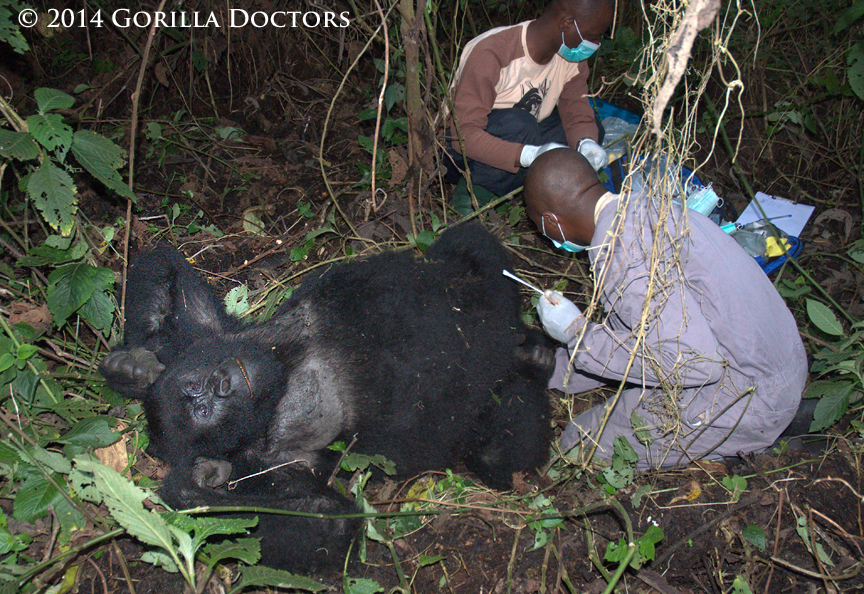 Mother Jicho is also sedated so that Drs. Eddy and Martin can safely remove the snare from her infant’s arm.
Mother Jicho is also sedated so that Drs. Eddy and Martin can safely remove the snare from her infant’s arm.
The wire snare was wrapped tightly around Kidumu’s left bicep. The wire was pressing tightly into the skin and the arm was slightly swollen, but thankfully, there was no open wound yet. The snare was removed with wire cutters, a physical exam was completed and samples were collected for future research.
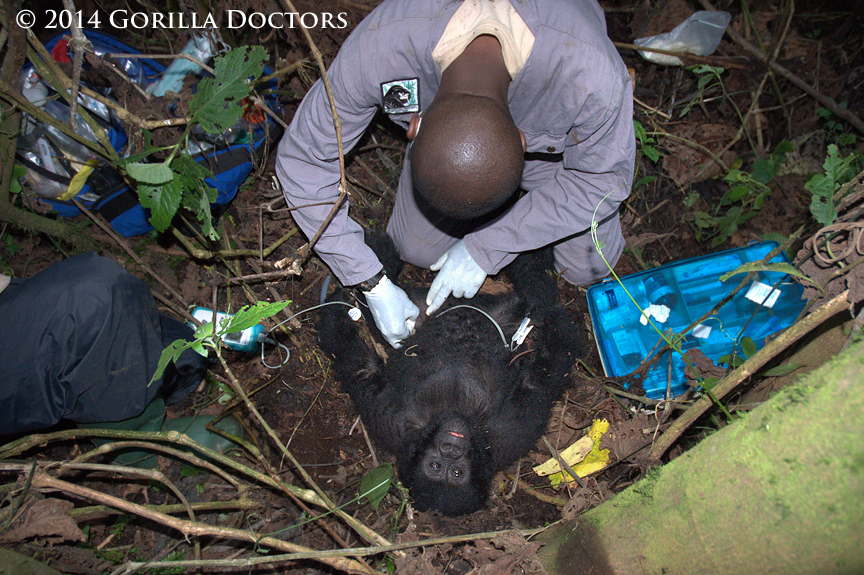 Dr. Eddy works quickly to conduct an exam and collect samples while the infant is under anesthesia.
Dr. Eddy works quickly to conduct an exam and collect samples while the infant is under anesthesia.
During the intervention, silverback Mvuyekure and the other group members were mostly quiet, feeding and moving in the periphery. But when the baby began to wake from the anesthesia, the silverback was alert and started charging aggressively. Since it was time for the gorillas to start making their night nests, we left the group and Mvuyekure joined adult female Jicho and infant Kidumu.”
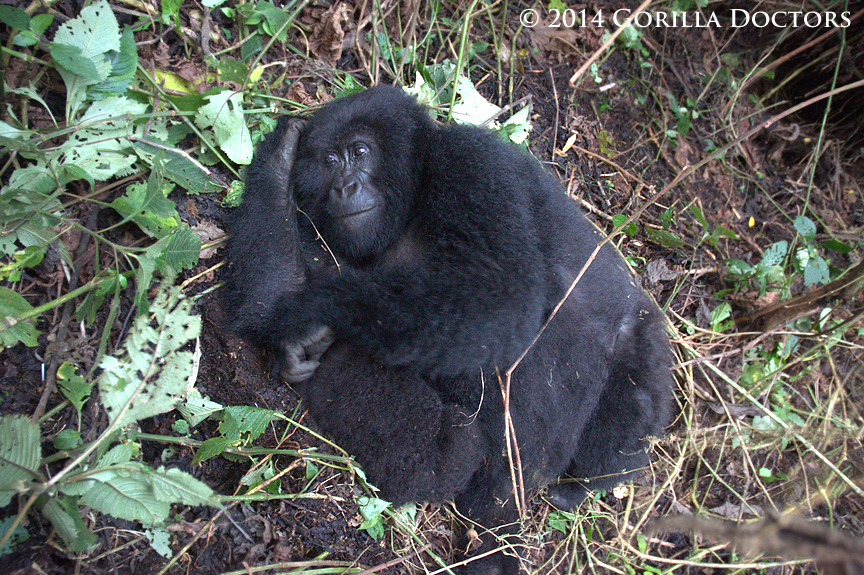 Mother Jicho and infant slowly wake from the anesthesia after the intervention.
Mother Jicho and infant slowly wake from the anesthesia after the intervention.
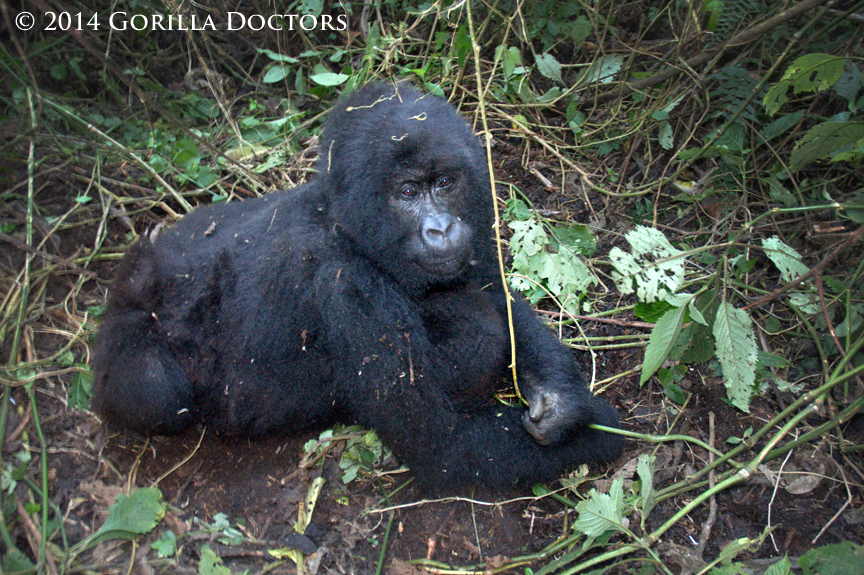 Mother Jicho slowly recovers from the anesthesia and moves off to join the group.
Mother Jicho slowly recovers from the anesthesia and moves off to join the group.
This is the ninth snare intervention Gorilla Doctors has conducted in 2014 (five in DRC, three in Rwanda, and one in Uganda). At the end of the M23 occupation of the Mikeno sector, the community members came back to their villages, and among them were poachers. This could perhaps explain the seeming increase in snare incidents in Virunga National Park within the previous months.
It is important to point out that in general, poachers set snares to catch antelope and other forest animals in order to feed their families. The land surrounding mountain gorilla habitat is some of the most densely populated in Africa, and most of the population is extremely poor. The pressure for food is enormous and some people turn to poaching to survive. Unfortunately, gorillas, especially infants and juveniles, sometimes get caught in these snares. Gorillas may lose limbs or digits to snares, or die as a result of infection or strangulation so Gorilla Doctors immediately mobilize to intervene and free the ensnared gorilla when a report comes in from the field.


 Donate
Donate
